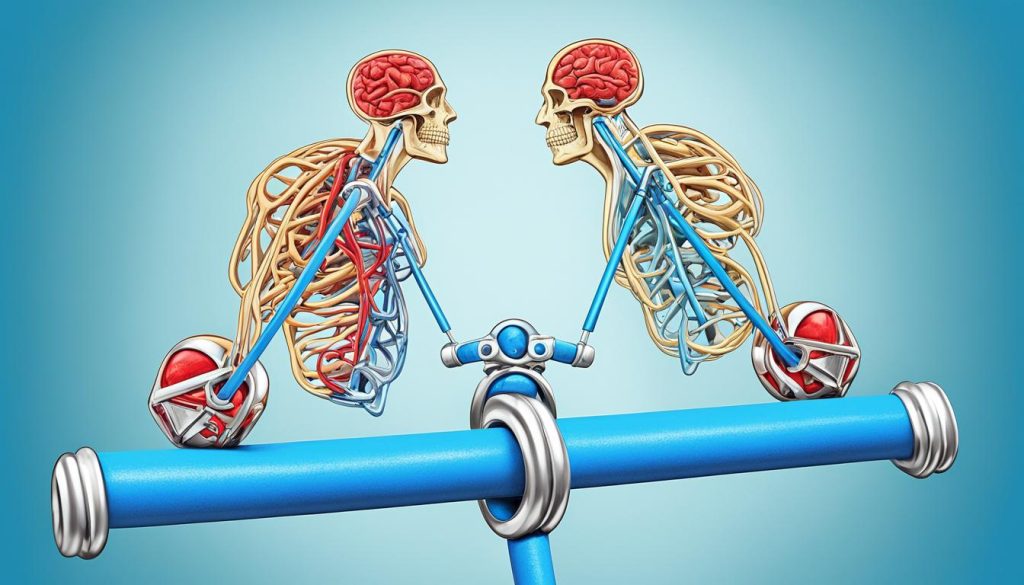Ad Blocker Detected
Our website is made possible by displaying online advertisements to our visitors. Please consider supporting us by disabling your ad blocker.
Research studies have explored the connection between erectile dysfunction (ED) and low testosterone levels. While low testosterone is not the only cause of ED, it has been found to be a contributing factor. Several studies have shown that men with low testosterone may experience a decrease in sexual desire and have difficulties achieving and maintaining erections suitable for sexual activity. However, it is important to note that the relationship between testosterone and ED is complex, as some men with low testosterone levels still have healthy erections. Additionally, low testosterone levels are often associated with chronic conditions such as type 2 diabetes, obesity, and heart disease, which are also linked to ED.
Key Takeaways
- Erectile dysfunction can be influenced by low testosterone levels.
- Low testosterone levels can result in a decrease in sexual desire.
- Maintaining healthy testosterone levels is important for overall sexual function.
- The relationship between testosterone and erectile dysfunction is complex.
- Other factors such as chronic conditions may also contribute to erectile dysfunction.
The Role of Testosterone in Erectile Function
Testosterone plays a crucial role in male sexual health and erectile function. It affects sexual desire and is involved in the physiological processes necessary for achieving and maintaining an erection. Testosterone stimulates the release of neurotransmitters in the central nervous system, such as dopamine, nitric oxide, and oxytocin, which contribute to the erection process. It also stimulates the spinal nerves to cause changes in the blood vessels that facilitate erection.
However, it is important to note that testosterone levels alone do not determine erectile function, as other factors such as blood flow, neurological conditions, and psychological factors also play a role. Hormonal imbalance, including low testosterone levels, can disrupt the delicate physiological balance necessary for optimal erectile function.
When testosterone levels are low, it can lead to a decrease in sexual desire, impede the body’s ability to achieve and maintain erections, and result in overall sexual dysfunction. However, it is crucial to recognize that the impact of low testosterone on erectile function may vary from person to person. Some men with low testosterone levels may still have satisfactory erections, while others may experience difficulties.
“The importance of testosterone in erectile function cannot be overstated. It acts as a key player in the complex interplay of physiological processes required for erections, influencing both the mind and body. However, it’s important to remember that testosterone isn’t the sole determinant of erectile function. It interacts with other factors, such as blood flow, neurological conditions, and psychological factors, to shape sexual health.” – Dr. Matthew Johnson, Urologist
Understanding the role of testosterone in erectile function is essential for comprehending the complex dynamics that contribute to male sexual health. While testosterone is a crucial component, it is just one piece of the puzzle. Addressing hormonal imbalance is important, but a comprehensive approach that takes into account other factors is necessary for optimal sexual health.
The Interplay of Testosterone and Other Factors
Erectile function is a multifaceted process influenced by various interconnected factors. Testosterone levels, while influential, are not the sole determinants of erectile function. Here are some other key factors that play a role:
- Blood Flow: Proper blood flow to the penis is essential for achieving and maintaining erections. Conditions like atherosclerosis, diabetes, and high blood pressure can restrict blood flow and contribute to erectile dysfunction.
- Neurological Conditions: Nerve damage or conditions such as multiple sclerosis, Parkinson’s disease, or spinal cord injuries can affect the communication between the brain and the reproductive system, impacting erectile function.
- Psychological Factors: Mental health conditions like depression, anxiety, stress, or relationship issues can interfere with sexual desire and erectile function.
Addressing these factors alongside hormonal imbalance can lead to a more comprehensive approach in managing erectile dysfunction and improving male sexual health. Consulting with a healthcare professional is vital in determining the underlying causes and developing an individualized treatment plan.

The Relationship Between Testosterone and Erectile Dysfunction
Research studies have shown a significant relationship between testosterone deficiency and erectile dysfunction. Low testosterone levels can contribute to a decrease in sexual desire, as well as difficulties in achieving and maintaining erections. Men with low testosterone may experience fewer spontaneous and sexual-related erections, leading to male impotence.
However, the impact of low testosterone on erectile function may vary from person to person. It is important to note that some men with low testosterone levels may still have satisfactory erections. This suggests that other factors, such as chronic conditions and psychological factors, can also contribute to erectile dysfunction.
“Studies have shown that low testosterone levels are associated with an increased risk of developing erectile dysfunction.”
While testosterone deficiency plays a significant role in male impotence, it is important to consider the influence of other factors on erectile function. Chronic conditions such as type 2 diabetes, obesity, and heart disease are often associated with both low testosterone levels and erectile dysfunction. Psychological factors, such as stress, anxiety, and depression, can also contribute to the development of sexual health issues.
Understanding the complex relationship between testosterone and erectile dysfunction is crucial in developing effective treatment strategies. By addressing both testosterone levels and other underlying causes, healthcare professionals can provide comprehensive and personalized care to improve male sexual health.
Image:
 |
Testosterone Replacement Therapy (TRT) and Erectile Dysfunction
Testosterone replacement therapy (TRT) is frequently prescribed as a treatment for men with low testosterone levels. It aims to restore optimal hormone levels and alleviate symptoms associated with low testosterone, including sexual dysfunction. While TRT can improve sexual desire and certain aspects of sexual function, such as libido, its effectiveness in treating erectile dysfunction may vary.
Some men undergoing TRT may experience improvements in their erections, but it is important to note that TRT alone is unlikely to completely resolve erectile dysfunction. Erectile dysfunction can have various underlying causes, and addressing those causes is crucial for comprehensive treatment.
For individuals on TRT who still experience difficulties with achieving and maintaining erections, additional medications such as phosphodiesterase-5 inhibitors (PDE-5 inhibitors) like Viagra, Cialis, or Levitra may be recommended. These medications work by enhancing blood flow to the penis, helping to facilitate an erection when sexual stimulation occurs.
It is essential to approach TRT carefully and under the supervision of a healthcare professional. Like any medical treatment, TRT can have risks and side effects, and its long-term safety and effectiveness are still being studied. Regular monitoring, dosage adjustments, and ongoing evaluation are necessary to ensure optimal outcomes and minimize potential risks.
If you are considering TRT for erectile dysfunction, consult with a healthcare professional to discuss your specific situation, medical history, and potential treatment options. They will be able to provide you with personalized guidance and develop a comprehensive treatment plan that addresses the underlying causes of your erectile dysfunction.

Weighing the Pros and Cons of TRT for Erectile Dysfunction
Before starting TRT for erectile dysfunction, it is important to understand the potential benefits and risks. While TRT can improve sexual desire and certain aspects of sexual function, there are considerations to keep in mind:
- Pros of TRT for Erectile Dysfunction:
- May improve sexual desire and libido
- Can enhance certain aspects of sexual function
- Potential to improve general well-being and quality of life
- Cons of TRT for Erectile Dysfunction:
- Risks and side effects, such as acne, fluid retention, and sleep apnea
- Long-term safety and effectiveness are still being studied
- May require ongoing monitoring and dosage adjustments
- Does not address other potential underlying causes of erectile dysfunction
Considering these factors, it is essential to have a thorough discussion with your healthcare provider to weigh the potential benefits against the risks and determine the most appropriate course of action for your individual needs.
Conclusion
In conclusion, there is a strong association between low testosterone levels and erectile dysfunction (ED). Low testosterone can contribute to decreased sexual desire, difficulties in achieving and maintaining erections, and overall sexual dysfunction. However, it is essential to note that ED is a complex condition influenced by various factors, including chronic conditions, neurological issues, and psychological factors.
While testosterone replacement therapy (TRT) may improve sexual desire and certain aspects of sexual function, its effectiveness in treating erectile dysfunction may vary from individual to individual. It is crucial for individuals experiencing ED to consult with a healthcare professional to determine the underlying causes and develop a personalized treatment plan.
This treatment plan may include testosterone replacement therapy along with other interventions, depending on the individual’s specific needs. Additionally, adopting a healthy lifestyle, which includes regular exercise, a balanced diet, and addressing other health conditions, can significantly contribute to overall sexual health and well-being.
FAQ
Can erectile dysfunction be caused by low testosterone?
While low testosterone is not the only cause of erectile dysfunction, it can be a contributing factor. Several studies have shown that men with low testosterone may experience a decrease in sexual desire and have difficulties achieving and maintaining erections suitable for sexual activity.
What is the role of testosterone in erectile function?
Testosterone plays a crucial role in male sexual health and erectile function. It affects sexual desire and is involved in the physiological processes necessary for achieving and maintaining an erection. Testosterone stimulates the release of neurotransmitters in the central nervous system, such as dopamine, nitric oxide, and oxytocin, which contribute to the erection process. It also stimulates the spinal nerves to cause changes in the blood vessels that facilitate erection.
Is there a relationship between testosterone and erectile dysfunction?
Yes, there is a relationship between testosterone and erectile dysfunction. Low testosterone levels have been associated with an increased risk of developing erectile dysfunction. Testosterone deficiency can lead to a decrease in sexual desire, fewer spontaneous and sexual-related erections, and difficulties in achieving and maintaining erections. However, the impact of low testosterone on erectile function may vary from person to person, and other factors such as chronic conditions and psychological factors can also contribute to erectile dysfunction.
How does testosterone replacement therapy (TRT) affect erectile dysfunction?
Testosterone replacement therapy is often used to treat low testosterone levels in men. While TRT can improve sexual desire and certain aspects of sexual function, its effectiveness in treating erectile dysfunction is not consistent. Some men on TRT may experience improvements in their erections, but additional help from medications such as phosphodiesterase-5 inhibitors (PDE-5 inhibitors) like Viagra, Cialis, or Levitra may still be needed. It is important to note that TRT alone is unlikely to completely resolve erectile dysfunction, as other underlying causes need to be addressed.
What is the conclusion regarding testosterone and erectile dysfunction?
In conclusion, there is a link between low testosterone levels and erectile dysfunction. Low testosterone can contribute to decreased sexual desire, difficulties in achieving and maintaining erections, and overall sexual dysfunction. However, it is not the sole cause of erectile dysfunction, as other factors such as chronic conditions, neurological conditions, and psychological factors can also play a role. It is important for individuals experiencing erectile dysfunction to consult with a healthcare professional to determine the underlying causes and develop a personalized treatment plan that may include testosterone replacement therapy along with other interventions. Regular exercise, a healthy diet, and addressing other health conditions can also contribute to overall sexual health.
Do Low Testosterone Levels Contribute to Erectile Dysfunction?
Low testosterone levels can indeed contribute to erectile dysfunction. The hormone plays a crucial role in sexual function, and when levels are low, it can lead to problems with arousal and maintaining an erection. It’s important to address low testosterone and sexual performance issues with a healthcare professional.


